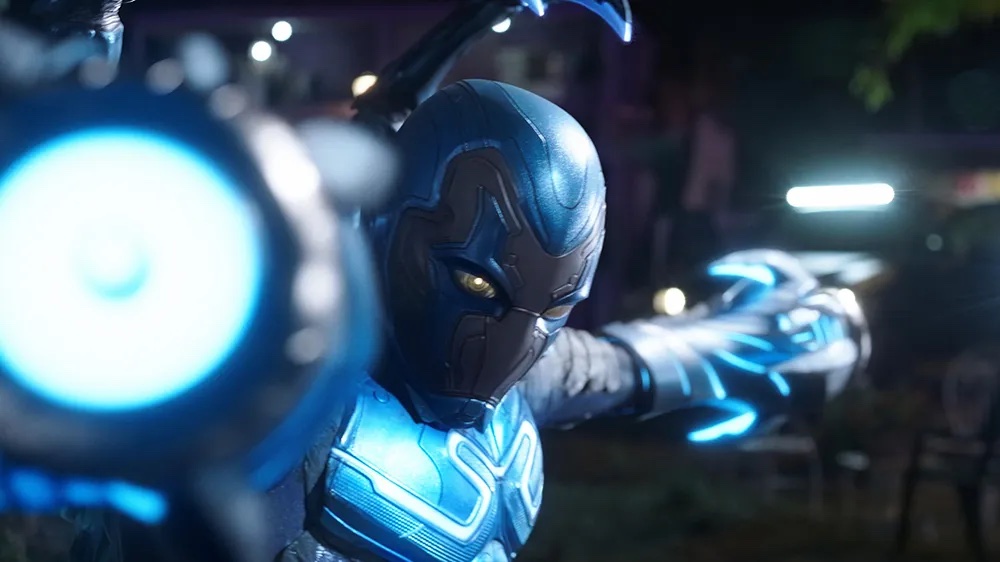
James Gunn has promised a rebirth to the D.C. Comics cinematic franchise with the upcoming “DCU.” One would think that the stunning stalling—if not all out decline—of Marvel’s own empire in recent films would leave a natural opening. But Warner Bros. and Gunn’s first attempt at a renaissance, the origin story of Blue Beetle, fails to deliver a convincing enough reason to care.
Though it is encased in a genuinely heartfelt Latino family story, the inside is as familiar as ever, offering up every possible superhero origin story cliché one can think of, as if smashing into a single carcass all the films that inspired it. The end result is an OK but entirely forgettable first act for this supposed new DCU phase, one that shows the long road that the franchise still has to go to excise itself of its prior, crusty coverings.
This story focuses on teenager Jaime Reyes (Xolo Maridueña) as he returns home from high school in hopes of a better future. His family, grounded by the Oscar-nominated Mexican actress Adriana Barraza as grandma, is loving, hardworking, and very proud of its Mexican heritage. Spanglish abounds in the household, and the film continues the interesting (and likely financially clever) trend of certain Hollywood studios of appealing to the second-most common language in the United States by ensuring that Gareth Dunnet-Alcocer’s script is delivered at least in part in the family’s native tongue. Jaime’s mother is also hardworking and his younger sister is charming, while uncle Jaime (George Lopez) is the most consequential beyond abuela. The family aspires to a better future, and their tender presentation at the outset is the film’s best and most honestly refreshing moment.
Quickly though, things go off the rails for the Reyes family—and for Blue Beetle itself. Jaime is unable to secure gainful employment beyond the humiliation of working for the powerful, greedy local Kord family, led mostly by the ruthless businesswoman Victoria (Susan Sarandon, underutilized). There is injustice in the world, and post-industrial, technocratic capitalism run amok and imperialism are to blame, the script tells us. These cliches are the first sign of trouble, and they quickly mount thereafter.
Jaime’s life is suddenly transformed when a mysterious device known as the Scarab chooses him as his potentially symbiotic host, giving Jaime a host of incredible powers—mostly the ones one would think the crunchy hard thorax of a beetle would have. Victoria is hellbent, naturally, in acquiring Scarab for her own greedily evil ambitions. A love interest comes in and out of the picture, and Jaime is left to discovery himself and face familiar family challenges along the way as the incognito titular superhero.
Director Angel Manuel Soto, mostly a newcomer, acquits himself as well he can with this decidedly uninteresting twist in the materials. The effects, as they tend to in these films of late, quickly overwhelm the action and render it confusing. Cinematographer Pawel Pogorzelski struggles to keep up with the ever changing lights and sounds, and perhaps the best below the line element for Blue Beetle becomes Bobby Krlic’s enigmatic and at times cryptic score. If DCU hires Krlic, whose main film credits include Ari Aster collaborations, that will surely go a long way to making the franchise’s movies obtain the air of newness they so desperately lack.
Despite all the many well-intentioned and functioning elements of the film, Blue Beetle, stripped of the tender family story shell with which it surrounds itself, is both tragically familiar and, at times, endlessly frustrating in the dishonesty of its anti-capitalist message. As to the former point—you know exactly how superhero origin/discovery stories go at this point, having seen them from Spider-Man to Iron-Man as well as countless forgettable DCEU characters.
As to the latter, it is impossible to take the anti-capitalist, anti-imperialist trope of the superhero movie seriously, and the film itself never does. What could be a more salient, lasting, and memorable sign of American imperialist cultural expansion than cinema itself? What other American product has been able to so swiftly and welcomingly invade country after country, culture after culture, forever altering it if not changing it, all in the singular pursuit of American hegemony in the pocketbook as well as in the cultural imagination? Nothing else—not Coca-Cola, not McDonalds—continued the American imperial exercise post WW2 in such convincing fashion as Hollywood’s products did, led in large part by the studio that now purports to decry other such invasions.
An honest film, one that embraces the place of major studios in the history of cultural exports and assimilation and perhaps pokes fun of it or openly embraces it, would have let the film rise and fall on its own merits. But a film that insists on being the hulk of various messages will be judged on the merits of those ideas as well, and not just on the technical or cinematic achievements it portrays. Blue Beetle is the later, and while it mostly succeeds as an entertaining superhero movie, it utterly fails as an introspective one.
Grade: B-
Blue Beetle is Warner Bros. film coming to theaters August 18, 2023.
Twitter: @jdonbirnam
Instagram: @awards_predix





